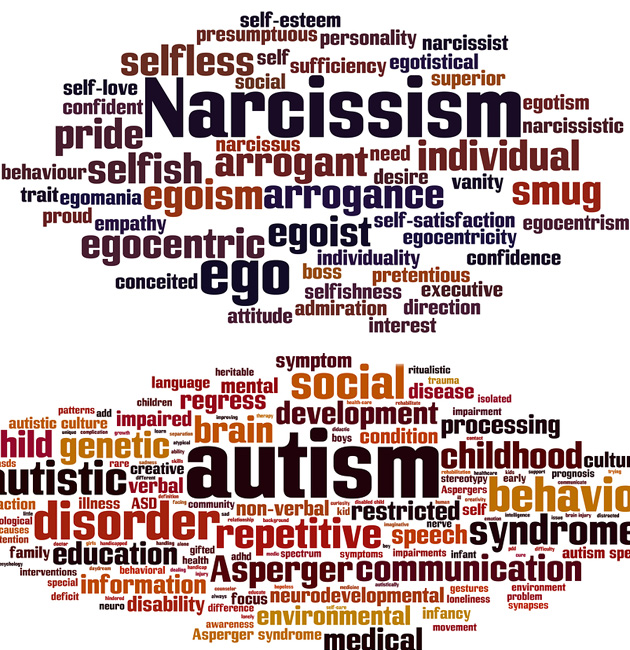Narcissistic personality disorder
Narcissistic personality disorder:
Narcissistic personality disorder (NPD) is a personality disorder in which there is a long-term pattern of abnormal behavior characterized by exaggerated feelings of self-importance, an excessive need for admiration, and a lack of understanding of others' feelings. People affected by it often spend a lot of time thinking about achieving power or success, or about their appearance. They often take advantage of the people around themPeople with narcissistic personality disorder believe they are superior or special, and often try to associate with other people they believe are unique or gifted in some way. This association enhances their self-esteem, which is typically quite fragile underneath the surface. Individuals with NPD seek excessive admiration and attention in order to know that others think highly of them. Individuals with narcissistic personality disorder have difficulty tolerating criticism or defeat, and may be left feeling humiliated or empty when they experience an "injury" in the form of criticism or rejection.

Developmental coarse:
Narcissistic personality disorder affects more males than females, and it often begins in the teens or early adulthood. Keep in mind that, although some children may show traits of narcissism, this may simply be typical of their age and doesn't mean they'll go on to develop narcissistic personality disorder.
Symptoms:
Signs and symptoms of narcissistic personality disorder and the severity of symptoms vary. People with the disorder can:
- Have an exaggerated sense of self-importance
- Have a sense of entitlement and require constant, excessive admiration
- Expect to be recognized as superior even without achievements that warrant it
- Exaggerate achievements and talents
- Be preoccupied with fantasies about success, power, brilliance, beauty or the perfect mate
- Believe they are superior and can only associate with equally special people
- Monopolize conversations and belittle or look down on people they perceive as inferior
- Expect special favors and unquestioning compliance with their expectations
- Take advantage of others to get what they want
- Have an inability or unwillingness to recognize the needs and feelings of others
- Be envious of others and believe others envy them
- Behave in an arrogant or haughty manner, coming across as conceited, boastful and pretentious
- Insist on having the best of everything — for instance, the best car or office
- At the same time, people with narcissistic personality disorder have trouble handling anything they perceive as criticism, and they can:
- Become impatient or angry when they don't receive special treatment
- Have significant interpersonal problems and easily feel slighted
- React with rage or contempt and try to belittle the other person to make themselves appear superior
- Have difficulty regulating emotions and behavior
- Experience major problems dealing with stress and adapting to change
- Feel depressed and moody because they fall short of perfection
- Have secret feelings of insecurity, shame, vulnerability and humiliation
Causes:
The causes of narcissistic personality disorder are unknown.Experts tend to apply a biopsychosocial model of causation, meaning that a combination of environmental, social, genetic and neurobiological factors are likely to play a role in formulating a narcissistic personality.
Genetic
There is evidence that narcissistic personality disorder is heritable, and individuals are much more likely to develop NPD if they have a family history of the disorder. Studies on the occurrence of personality disorders in twins determined that there is a moderate to high heritability for narcissistic personality disorder.
However the specific genes and gene interactions that contribute to its cause, and how they may influence the developmental and physiological processes underlying this condition, have yet to be determined.
Environment
Environmental and social factors are also thought to have a significant influence on the onset of NPD. In some people, pathological narcissism may develop from an impaired attachment to their primary caregivers, usually their parents. This can result in the child's perception of himself/herself as unimportant and unconnected to others. The child typically comes to believe they have some personality defect that makes them unvalued and unwanted.[19] Overindulgent, permissive parenting as well as insensitive, over-controlling parenting, are believed to be contributing factors.
Complications:
Complications of narcissistic personality disorder, and other conditions that can occur along with it, can include:
- Relationship difficulties
- Problems at work or school
- Depression and anxiety
- Physical health problems
- Drug or alcohol misuse
- Suicidal thoughts or behavior
Treatment:
There is no known cure for NPD. With psychotherapy, the individual may come to understand what causes their problems and learn how to relate more positively to others.
This may bring about a change in attitudes, resulting in more constructive behavior. It can help the person build up their self-esteem and acquire realistic expectations of themselves and others.
Cognitive behavioral therapy (CBT), family therapy, or group therapy are types of psychotherapy. CBT helps the patient identify negative beliefs and behaviors, in order to replace them with healthful, positive ones.
Medication may help with some of the more distressing aspects of the condition.

References:
- Narcissisitic personality disorder.(n.d).Retrieved from: https://en.wikipedia.org/wiki/narcissistic-personality-disorder.accessesd on 11 march 2018
- Psychology today.(n.d).Retrieved from: https://www.psychologytoday.com/conditions/narcissistic-personality-disorder.accesses on 11 march 2018
- Mayo clinic.(n.d).Retrieved from: https://www.mayoclinic.org/diseses-conditions/narcissistic-personality-disorder.accessesd on 11 march 2018
- Medical news today.(n.d).Retrieved from: https://www.medicalnewstoday.com/articles/9741.php.accessesd on 11 march 2018

Comments
Post a Comment